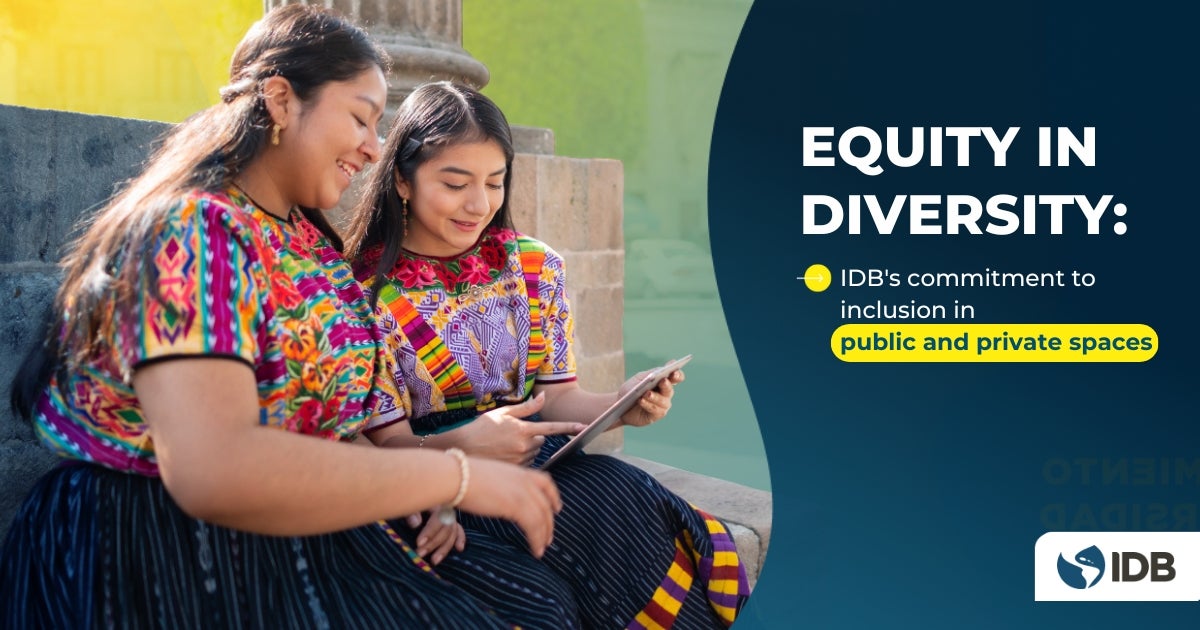Este artículo está también disponible en / This post is also available in: Spanish
Latin America and the Caribbean (LAC) is one of the most diverse regions in the world, but also one of the most unequal. These two realities are two sides of the same coin. It is a fact that not all inhabitants of the region have access to the same opportunities, which often translates into discrimination, whether based on ethnicity, gender, sexual orientation, or disability.
Where does exclusion occur? It can happen in both public spaces, such as streets and squares, and in private settings, with housing being the most common. The Inter-American Development Bank (IDB), in its mission to improve the lives of all Latin Americans and Caribbeans, works to reduce inequality and exclusion in all spaces, both public and private.
For this reason, within the Housing and Urban Development Division of the IDB, we work to promote inclusion and universal access in our cities and homes through programs and technical assistance to countries in the region. In this article, we share some experiences on how to incorporate gender and diversity approaches into our operations, moving from words to action to promote more inclusive and equitable spaces.
Inclusion Programs in Public Spaces:
The Housing and Urban Development Division of the IDB is working on inclusion programs in public spaces in Brazil, Colombia, and Chile:
Integrated and Sustainable Urban Development Program, Brazil:
This program aims to prevent and combat violence and exclusion against vulnerable people, both in urban public spaces and institutional environments. As part of the program, a course was conducted for metropolitan civil guards and members of municipal public institutions addressing issues related to gender, masculinities, people with disabilities, race, and LGBTIQ+ population.
Biodivercity and Urban Equity Program in Barranquilla, Colombia:
This program in the city of Barranquilla, along with the Migrant Population Inclusion Project, promotes the design, construction, adaptation, and operation of multifunctional community centers, prioritizing youth, women, the elderly, and migrant populations. It also promotes the development of low-carbon and climate-resilient recreational infrastructure, including the design, construction, and recovery of parks, squares, green areas, and public spaces, under guidelines that guarantee universal access for people with disabilities. It also includes the establishment of a new Local Integration Center for Migrants as an intercultural space for the integration of migrant populations with inclusive spaces and social services, allowing for their protection and regularization in the country. Additionally, it will contribute to the consolidation of integration routes for this population and strengthen support networks between migrants and the host community.
Urban Camp Integration Program, Chile:
In Chile, this program proposes that works will have climatic criteria, gender perspective, universal accessibility design, and sociocultural relevance in their development. It also includes mechanisms for the strategic prioritization of camps to be intervened, incorporating social risk criteria (gender and diversity) and climate change. Additionally, it addresses the elaboration of socio-urban inclusion diagnoses with systematic inclusion of gender and diversity aspects, climate risk, and migration for each camp.
Inclusion Programs in Private Spaces:
ProMorar Brazil – Promotion of New Housing Strategies, Brazil:
This program proposes strengthening the capacities of public actors on gender and diversity gaps in housing. It also includes improving the culture of disaggregated data on gender, ethnicity, race, and disability that will strengthen future targeted housing programs for women, people with disabilities, Afro-descendants, and indigenous people. Likewise, a technical study will be carried out with a diagnosis and policy proposal to facilitate women’s access to housing microcredit with an intersectional approach. This program will train agents from the public and private sectors on barriers and prejudices towards women, people with disabilities, LGBTQ+ individuals, Afro-descendants, and indigenous people.
Housing Solutions for Poor and Vulnerable Households Program, Ecuador:
In Ecuador, the IDB, through this program, aims to reduce the quantitative housing deficit for the rural population of the last two income quintiles in the country, prioritizing households with specific vulnerability indicators. To make this possible, subsidies were implemented for property titling in the name of women or shared with their partner, subsidies for housing construction on owned land provided to female heads of households, and for households with people with disabilities.
Inclusion Programs in Mixed Spaces:
In many cases, inclusion must be fostered by addressing both public spaces and housing. That’s the case with these two programs from the IDB in Brazil and Paraguay:
Urban Improvement and Citizen Security Program in Vitória, Brazil:
This initiative incorporates opportunities to promote equality and will have baseline data disaggregated by gender and race, such as: the number of women in situations of violence assisted, the number of homicides of women, and homicides of Afro-descendant youth, both male and female. It also includes the construction of safe public spaces for women and youth. Likewise, addressing aspects of private spaces, it also incorporates cadastral regularization and property titling, prioritizing the titling of female heads of households.
Rehabilitation and Housing Program for Bañado Sur in Asunción, Paraguay:
This program includes inclusion in both public and private spaces. Therefore, it worked with the participation of women in job training and productive development activities, workshops, and activities organized within the scope of the “Neighborhood Without Violence” Program for the prevention of gender-based violence and intra-family violence in the neighborhood. Likewise, this project made it possible for property titles to be registered in the property registry in the name of both spouses in the case of married couples or in the name of women.
Improving inclusion is our commitment:
In the Housing and Urban Development Division of the IDB, we strive to promote inclusion in both public and private spaces in Latin America and the Caribbean through programs and technical assistance to countries in the region. We recognize the importance of addressing these challenges comprehensively, and we will continue to work together with countries and local communities to build more inclusive cities and homes for everyone. In summary, we will continue working to further improve lives in our region.


Leave a Reply